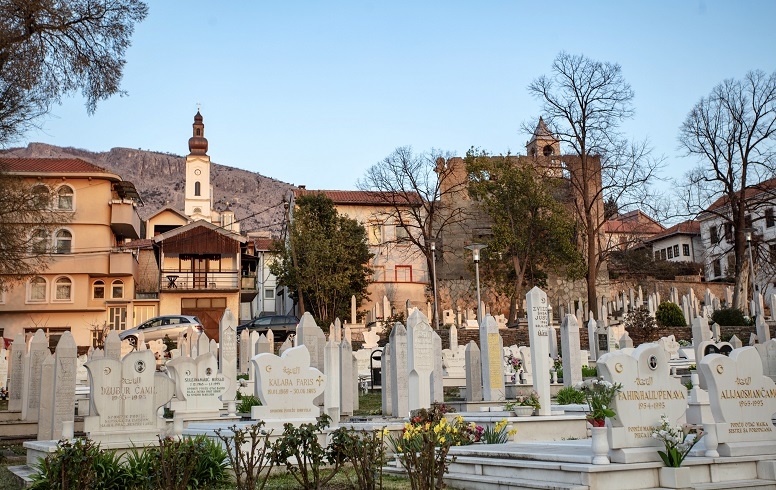Field Work: What TikTok Can Teach Us about War
| by Stephen Diehl
Middlebury Institute student researcher Tricia White has found TikTok a valuable tool for gathering open-source intelligence on the Russia-Ukraine war.

What lessons do the Yugoslav wars of 1991–2001 hold for us today, decades after the conflict ceased?
That was the driving question at the center of a popular immersive travel course that resumed this year after being interrupted by the pandemic.
In Peacebuilding and Reconciliation in the Balkans, students explore and challenge common narratives about nationalism, conflict, and peace. They traveled to Belgrade, Serbia; Pristina, Kosovo; and Mostar, Potocari, and Sarajevo in Bosnia and Herzegovina.
“The former Yugoslavia is a unique laboratory to consider the power and powerlessness of nationalism as an organizing framework for human societies,” noted Associate Professor Thor Sawin, a linguist, who led the course. “This area of the world is associated with some of the most graphic evidence of nationalism’s dangers.”
The local coordinator for the course was Svetlana Kijevcanin, a psychologist and peace activist with more than 25 years of experience working with NGOs, civil society organizations, policymakers, and private sector partners in the Balkans.
Throughout the nine-day course, students captured a wide range of photos, which they shared for this story.
Something that was fascinating for me—and something important for Middlebury as we think about conflict transformation—is thinking about language, and the ways that language can help build peace, but can also impact conflict.
During their travels, the students collaborated on an Instagram takeover.
The Balkans course was first conceived by the late professor Jan Black, a beloved teacher and activist who died in 2021, and for whom the Jan Knippers Black Fund for Human Rights Protection is named. The course, which is open to both undergraduates and graduate students, will be offered again in the spring of 2023. For more information, contact Professor Thor Sawin.
The resumption of the course coincided with Middlebury’s announcement of the Kathryn Wasserman Davis Collaborative in Conflict Transformation.
Kathryn Wasserman Davis Collaborative in Conflict Transformation
MA in TESOL and MA in Teaching Foreign Language
| by Stephen Diehl
Middlebury Institute student researcher Tricia White has found TikTok a valuable tool for gathering open-source intelligence on the Russia-Ukraine war.
| by Stephen Diehl
The IEP candidate and Peace Corps alum is helping combat food insecurity through her International Professional Service Semester with the California nonprofit Valley Verde.
| by Netta Avineri, Gabriel Guillen, and Thor Sawin
Three Middlebury Institute faculty members, Netta Avineri, Gabriel Guillen, and Thor Sawin, share their experiences cultivating mobile mindsets in courses designed to rely heavily on personal interactions, partnerships, and travel, but had to be reimagined due to Covid-19.